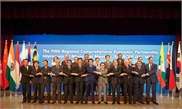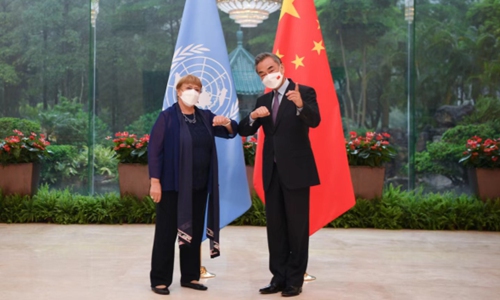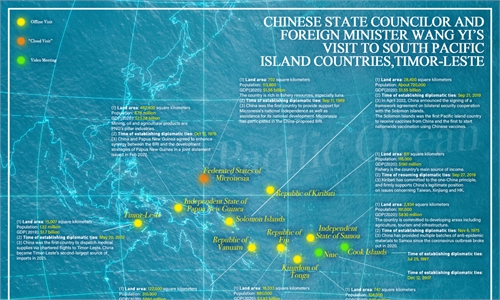China-South Pacific cooperation highlighted by provincial partnership; ties trace back to Xi's promotion of Juncao, rice tech in PNG in 2001

Photo taken on July 5, 2020 shows the beautiful landscape of Nanuku Auberge Resort on Fiji's main island of Viti Levu. (Xinhua/Zhang Yongxing)
Chinese provinces and South Pacific nations have over the past several decades formed long-lasting, in-depth ties, and one case in point is that cooperation between East China's Fujian Province and Papua New Guinea (PNG), recommended by President Xi Jinping two decades ago, has helped lift tens of thousands of locals out of poverty.
As Chinese State Councilor and Foreign Minister Wang Yi embarked on a trip to the South Pacific region, three Chinese provinces — Fujian, East China's Shandong and South China's Guangdong — on Wednesday highlighted fruitful results of their cooperation with relevant nations in such fields as the economy, trade, healthcare and education, pledging to further boost cooperation with the Pacific island nations.
The remarkable results of the three Chinese provinces' cooperation with the South Pacific nations underscored China's long-lasting, in-depth and extensive exchanges with the region and the bright prospect for deeper cooperation based on mutual respect and win-win result, in stark contrast to the West's lip services and geopolitical gambits, experts noted on Thursday.
In 2000, Fujian and Eastern Highlands Province of PNG established a sister-province relationship, kicking off exchanges and cooperation between the province and Pacific island countries.
For example, personally overseen by Xi, who was then governor of Fujian, Fujian launched the Juncao and upland rice technology project in Eastern Highlands in 2001 and trained 623 people, playing an important role in reducing poverty and ensuring food security there, according to a list of cooperation results released by the Fujian local government on Wednesday.
Juncao, which literally means "mushroom" and "grass," can be used to grow edible mushrooms. The Chinese Juncao project in PNG, recommended by Xi two decades ago, has helped lift tens of thousands of local people out of poverty, according to the Xinhua News Agency on April 12.
Starting with exchanges on Juncao technology, cooperation between Fujian and Pacific island countries extended to investment and the cultural, educational and healthcare sectors. In November 2020, Fujian Zhonghong Fishery Co signed a memorandum with the local government on building the Comprehensive Multifunctional Fishery Industrial Park on Daru Island in Western Province of PNG.
Meanwhile, many enterprises in Shandong and Guangdong provinces, including Xinfa Group, Yanjian Group and Shandong Lidao Oceanic Technology Com, have also participated in infrastructure, agricultural and fishery projects in such nations as Fiji, Samoa and the Federated States of Micronesia to support local economic and social development.
China Civil Engineering Construction Corp (CCECC), which entered the South Pacific market in 2003, told the Global Times that the company actively hires local people to join in its projects and teaches them working skills. With higher incomes, local workers' lives have seen great improvement.
"As the company actively integrates with the local society and bears its social responsibility, local people sometimes give papayas and coconuts to our workers, reflecting their recognition of us," CCECC said.
"With advantages of fast construction speed, competitive prices and high quality, Chinese construction companies have strong competitiveness in the South Pacific region," CCECC said, noting that there will be more opportunities in terms of green energy and green architecture in the region.
Since the start of the COVID-19 pandemic, Chinese provinces have also extended a helping hand to the best of their capability to Pacific island countries by donating medical supplies, sharing experience and ideas on the treatment and control of the pandemic.
An official with the Shandong provincial health commission surnamed Sun told the Global Times on Thursday that the first batch of medics who will aid Kiribati will be working at the Tungaru Central Hospital.
After surveying the local situation and on the basis of mutual respect, the Chinese medical team would join the medical services for local patients, including Chinese nationals as well as Kiribati local residents, Sun noted.
The Chinese team would also provide training for local medical workers if requested, Sun said, adding that medicine and treatment devices were shipped to Kiribati in advance.
"Whether for development or disaster relief, these projects are urgently needed in these countries. In this regard, their cooperation with China not only nurtures their capability but also increases their confidence to combat difficulties," Ruan Zongze, executive vice president of the China Institute of International Studies, told the Global Times on Thursday.
"Wang's upcoming visit is expected to result in multiple supportive agreements under discussion, and China's support will actually help bolster their ability to confront challenges from many aspects," Ruan said.
Located in the extension of the 21st Century Maritime Silk Road, Pacific island countries enjoy broad prospects for exchanges and cooperation with Chinese provinces, according to experts and business insiders.
In contrast to some Western countries that consider Pacific island countries as their backyard, China's cooperation with these nations is based on mutual respect and win-win results, Ruan said, noting that there is a natural closeness between China and these nations as developing countries in the Asia-Pacific region.
From 1992 to 2021, China's trade with Pacific island countries with which it has established diplomatic ties has jumped from $153 million to $5.3 billion, with an average annual growth rate of 13 percent and more than 30-fold increase in the past 30 years. As of the end of 2021, those Pacific island countries had received direct investment worth $2.72 billion from China.



